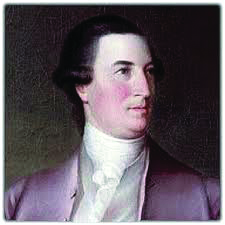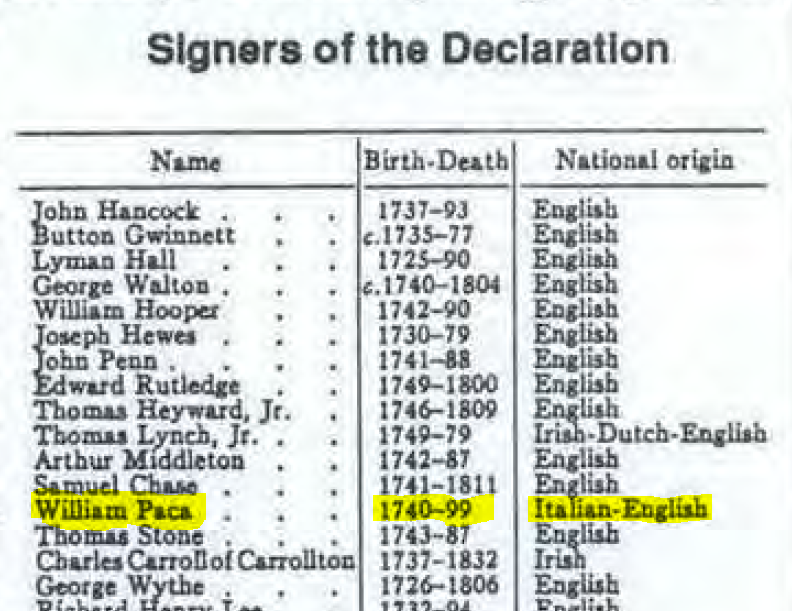There were 56 signers of the Declaration of Independence; of those we have confirmed Caesar Rodney of Delaware as having Italian roots. Another, William Paca of Maryland, has been elusive despite having an Italian-sounding name.

The search for Paca’s ethnicity has absorbed our community since 1937 when researcher Giovanni Schiavo contacted one of the signer’s descendants who confirmed an Italian lineage. Schiavo wrote a letter to that effect which was published in the NYTimes. However, in 1976 on the bicentennial of our Independence another family member denied any Italian connection. I have a whole file of articles written by local Maryland genealogists and historians asserting that such Italian claims have never been proved. They are correct. It’s all been circumstantial evidence – Paca’s surname, an errant relative, and the coincidence that Maryland’s state motto is in Italian (Fatti Maschi, Parole Femmine – “Deeds are Masculine, Words are Feminine”)
But even the circumstantial evidence appeared to be enough for Encyclopedia Britannica. In its 1969 edition the signers are listed by ethnicity and Paca is “Italian-English.” (see below)
Other tidbits of Paca’s life feed the notion of Italian roots. He made clear in a short rhyme he wrote that his surname is pronounced PAY-ca, not PAH-ca. The latter could be heard as Parker, a confusion he may have wanted to avoid. It would also have excluded English names like Pecker or Packer and single syllable names like Peake. Nevertheless, there are old documents that use these surnames.
Robert Paca, the original immigrant, only occasionally used Paca. He used Peca, Peaka and Peke, and signed his will “Peaker.” But his great-grandson William (the signer) clearly reverted to Paca and wanted to preserve that spelling. In 1904, someone suggested that the Pacas were related to Pope Leo XIII whose surname was Pecci (PEH-chee). Incidentally, the surnames Paca and Pacca have roots in central Italy where this pope also hailed from.

Curiously, William Paca named his son Aquila after his own grandfather. Aquila means eagle in Italian and Latin and is the capital of the Abruzzo region in central Italy. Deniers claim the name Aquila was often used by English families who admired classical Rome, just as biblical names abounded.
But, having Italian roots via England was not that rare in colonial America. Italian merchants and bankers populated England as well as other maritime nations like Spain and Portugal during the Age of Discovery and colonialization. Navigators John Cabot and his son Sebastian had roots in England. The famous Taliaferro clan came from England in the 1600s and shared their name with southern gentry and even Black educator Booker T. (Taliaferro) Washington. So, an “Italian” Paca is not out of the question, especially below the Mason-Dixon Line. Our researcher Ellen Maresca was able to trace signer Caesar Rodney’s roots to the Adelmare family from the Veneto region. Sir Caesar Adelmare became English gentry and shortened his surname to Caesar. His descendants in America kept Caesar even after marriage, hence signer Caesar Rodney.
Another interesting sidelight is that Robert “Peaker,” the original immigrant mentioned above was brought to America by a John Hall as an indentured servant. I short, Hall paid for Robert’s passage and gave him a job in Maryland around 1657. When Hall died, Robert married his wealthy widow whose name was Mary Parker Hall. Was that why Robert used the “Peaker” instead of Paca – to avoid confusion?
So, where do we go from here? Records in England have turned up no Pacas or Pecas, but no one wants to pay for a more extensive search. Researcher Schiavo noted that William Paca may have visited Italy around 1760 and claimed he wrote home while visiting “the land of my ancestors.” But no such letter has been found.
English spelling has been the rabbit hole in any research. In your gut you know there’s an Italian connection but the powers that be have zero interest in helping our cause. Perhaps if Paca were of another persuasion, doors would open. -JLM




I think there is enough evidence to prove that William Paca was of Italian descent. I trust a scholar like Giovanni Schiavo.
Schiavo was challenged to produce the Paca letter supposedly written from Italy. He never produced it. The real proof would be to find the first Paca who immigrated from Italy (Benevento is the suspect city) to England – this was how we traced Caesar (Adelmare) Rodney moving from Treviso, Italy to England. No such trail for the Pacas…yet.
I visited the Paca house. Fascinated to learn about Wm. Paca and Caesar Rodney. Benevento is familiar to my family.